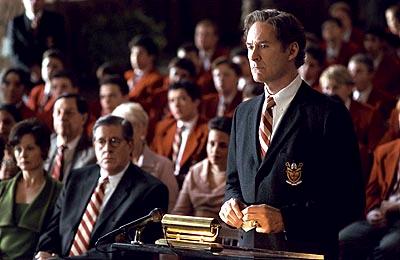"The American", in some ways, shares the same conflict and premises of "In Bruges" but minus the dry wit and dark humor. It's about an assassin retreating into a peaceful Italian village after a hit has gone grimmer than it should have been. George Clooney plays the eponymous role in what may be one of his most serious and subtlest roles to date. He strolls the brick-floored countryside, he forms a bond with a priest, he finds love in the form of a loving prostitute (yes, you may say 'not again!'), and he is able to enjoy the peace and quiet that could have easily been ennui for some.
Now let us not pretend that George Clooney's character Jack's life as a contract killer won't catch up with him even in the most obscure of places. He's an assassin, and as what cinematic hitmen has been trying to prove ever since, it's quite comfortable to resolve conflicts in a slick European setting. But as cliche-bound as the film may be, it's quite rich in its characters and effective in its overall execution. The film looks upon Jack not as an almost super-human hitman with constant tingling senses, but as a weary and directionless middle-aged man embracing the temporal comforts of the tranquil Italian landscapes.
There's even a scene that shows his almost paranoiac nerve response even to the slightest sound of a motor vehicle. Then, finding out that it's not what he thought it will be, not a man with a gun or femme fatale with a knife, he carefully shrugs and walks away. He never even bothered for a second look. He's tired.
"The American", in accord with its intriguingly simplistic yet paradoxical poster (entitled as "The American" yet looking like a European film in its lay-out), is a considerably compelling little thriller torn between two identities: The existentialist idea of a lone protagonist in an unfamiliar environment and the penetrating manifestation of a tragic love between two social misfits; either way, "The American" is still a rewarding watch that works both as an observing drama about mistakes and a solid commentary about regret. For the action skeptics, on the other hand, do not worry, George Clooney do have a fairly intense chase scene here.
Foot Note: Paolo Bonacelli, known for playing the sadistic fascist in "Salo", portraying a priest? Did he ever had any disturbing thoughts while he cooked that stew? Right now, I surely do.
Now let us not pretend that George Clooney's character Jack's life as a contract killer won't catch up with him even in the most obscure of places. He's an assassin, and as what cinematic hitmen has been trying to prove ever since, it's quite comfortable to resolve conflicts in a slick European setting. But as cliche-bound as the film may be, it's quite rich in its characters and effective in its overall execution. The film looks upon Jack not as an almost super-human hitman with constant tingling senses, but as a weary and directionless middle-aged man embracing the temporal comforts of the tranquil Italian landscapes.
There's even a scene that shows his almost paranoiac nerve response even to the slightest sound of a motor vehicle. Then, finding out that it's not what he thought it will be, not a man with a gun or femme fatale with a knife, he carefully shrugs and walks away. He never even bothered for a second look. He's tired.
"The American", in accord with its intriguingly simplistic yet paradoxical poster (entitled as "The American" yet looking like a European film in its lay-out), is a considerably compelling little thriller torn between two identities: The existentialist idea of a lone protagonist in an unfamiliar environment and the penetrating manifestation of a tragic love between two social misfits; either way, "The American" is still a rewarding watch that works both as an observing drama about mistakes and a solid commentary about regret. For the action skeptics, on the other hand, do not worry, George Clooney do have a fairly intense chase scene here.
Foot Note: Paolo Bonacelli, known for playing the sadistic fascist in "Salo", portraying a priest? Did he ever had any disturbing thoughts while he cooked that stew? Right now, I surely do.





